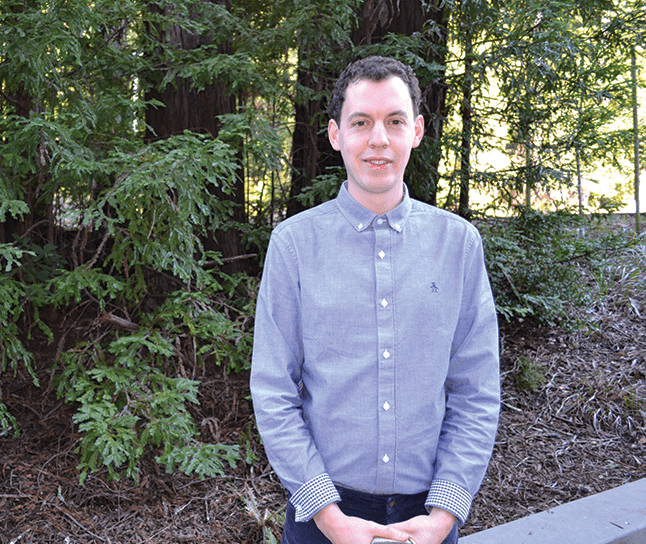SANTA CRUZ, CA – June 26, 2017 – UC Santa Cruz Genomics Institute (GI) Principal Investigator Benedict Paten has accepted a position as Assistant Professor in the Department of Biomolecular Engineering at UCSC. The professorship will begin July 1, 2017.
As a computational biologist and principal investigator at UCSC, Paten’s priorities are to develop the teams, build the tools and deploy the standards necessary to harness big data in bioinformatics. Paten’s goal is to deliver the statistical power necessary for scientists to decipher the relationships between genomes, gene expression, and disease.
Paten currently oversees the Center for Big Data in Translational Genomics, a multi-institutional partnership coordinated by UC Santa Cruz as part of the NIH Big Data to Knowledge (BD2K) project. BD2K’s overarching goal is to build an infrastructure for researchers and clinicians around the world to analyze massive sets of genomic information for medical use.
As Director of the GI’s Computational Genomics Lab (CGL), he worked with a team of undergraduate and graduate students, postdoctoral scholars, researchers and engineers. CGL is focused on building technology to connect isolated datasets where genomic information is siloed. A member of the Global Alliance for Genomics and Health, CGL is working to develop and implement interoperable standards in order to enable breakthroughs in some of the most promising areas of genomics research. For example, CGL is building the BRCA Exchange, a comprehensive, global data repository to catalog all BRCA gene variants and evidence of pathogenicity. Certain BRCA variants have been associated with several forms of cancer including breast, ovarian, prostate, and pancreatic.
Paten also leads an effort to develop a tool that looks at human genomes as a complex roadmap of alternative versions of human DNA sequences. Known as a genome graph, this tool will highlight insertions, deletions and rearrangements of DNA as compared to a reference genome — rather than skipping over these variations. It will allow researchers to finally create a comprehensive map of human genetic variation that accurately reflects human diversity. Paten and colleagues hope to release the first open-access genome graph, made up of over 1,000 individuals, within the year.
As Paten told Stat in late 2016, the genome graph “ … will be used everywhere in a multitude of ways we haven’t even imagined yet.” He elaborated, “I want to show you your path through the map so you can see how you fit. In many ways, it’s the human story.”
Paten originally came to UC Santa Cruz in 2007 as a postdoctoral scholar in Molecular Evolution. He holds a Bachelor’s of Science Degree in neuroscience from University College London; a diploma in computer science from University of Cambridge, and a Ph.D. in computational biology awarded jointly by the University of Cambridge and the European Molecular Biology Laboratory.
About the UC Santa Cruz Genomics Institute
Comprised of diverse researchers from a variety of disciplines across academic divisions, the UC Santa Cruz Genomics Institute leads UC Santa Cruz’s efforts to unlock the world’s genomic data and accelerate breakthroughs in health and evolutionary biology. Their platforms, technologies, and scientists unite global communities to create and deploy data-driven, life-saving treatments and innovative environmental and conservation efforts.
About the Baskin School of Engineering
The Baskin School of Engineering at UC Santa Cruz offers unique opportunities for education, research and training. Faculty, researchers and students at the Baskin School of Engineering seek new approaches to some of the most critical challenges of the 21st century, thriving within the domains of data science, genomics, bioinformatics, biotechnology, statistical modeling, high performance computing, sustainability engineering, human-centered design, communications, optoelectronics and photonics, networking and technology management. By leveraging novel tools that often emerge from changing technologies, BSOE faculty and researchers have pioneered new engineering approaches and disciplines, examples of which include biomolecular engineering, computational media, and technology and information management.
